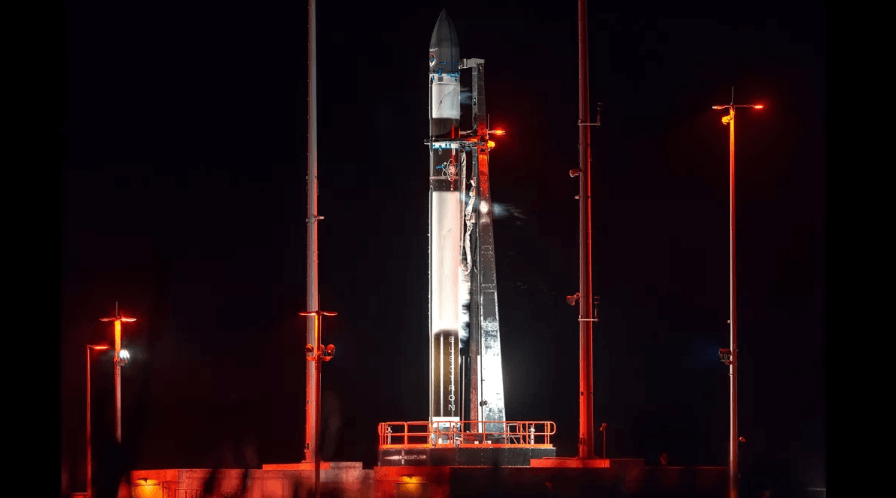Rocket Lab is scheduled to launch its Electron rocket from U.S. soil for the first time on Tuesday. The window for the launch three signal collection satellites for HawkEye 360 from the Mid-Atlantic Regional Spaceport (MARS) in Virginia runs from 6-8 pm EST (23:00-01:00 UTC). The company will webcast the launch on YouTube.
Rocket Lab had planned to launch on Monday, but deteriorating weather forced a 24-hour postponement.
Rocket Lab began as a New Zealand company, but later incorporated in the United States. The company has conducted all of its 32 launches from Mahia Peninsula in New Zealand. The new launch complex at MARS will allow Rocket Lab to better serve its U.S. customers.
Upcoming Launches
January 24-31 2023
| Date | Launcher – Organization | Payload – Organization | Purpose | Launch Site |
|---|---|---|---|---|
| Jan. 24 6:00-8:00 p.m. EST (23:00–01:00 UTC) |
Electron – Rocket Lab | Hawk 6A, 6B, 6C – HawkEye 360 | Signal collection | Mid-Atlantic Regional Spaceport |
| Jan. 25 (01:00 UTC) |
H-IIA – MHI* | IGS-Radar 7 – CSICE | Reconnaissance | Tanegashima |
| Jan. 26 4:02 am EST (09:02 UTC) |
Falcon 9 – SpaceX | Starlink – SpaceX | Communications | Cape Canaveral |
| Jan. 31 3:27 am EST (08:27 UTC) |
Falcon 9 – SpaceX | Starlink – SpaceX | Communications | Kennedy |
SpaceX has a pair of Starlink launches planned from Florida later this month. The company will webcast the launches on YouTube. Japan will launch the IGS-Radar 7 reconnaissance satellite later this week.
Orbital Launches
Week of Jan. 16, 2023
| Date | Launcher – Organization | Payload – Organization | Purpose | Launch Site |
|---|---|---|---|---|
| Jan. 15 | Long March 2D – CASC* | 14 satellites – multiple | Earth observation, tech demo | Taiyuan |
| Jan. 15 | Falcon Heavy – SpaceX | CBAS-2, LDPE-3A – U.S. Space Force | Communications, tech demo | Kennedy |
| Jan. 18 | Falcon 9 – SpaceX | GPS III-06 Amelia Earhart – U.S. Space Force | Navigation | Cape Canaveral |
| Jan. 19 | Falcon 9 – SpaceX | 51 Starlink – SpaceX | Communications | Vandenberg |
SpaceX conducted three of the four launches worldwide last week. SpaceX has now orbited 3,717 Starlink satellites on 71 Falcon 9 launches since February 2018.
A Long March 2D rocket orbited 14 spacecraft in a rideshare mission from the Taiyuan Satellite Launch Center.
Orbital Launches by Nation
| Nation | Successes | Failures | Partial Failures | Total |
|---|---|---|---|---|
| United States | 5 | 2 | 0 | 7 |
| China | 5 | 0 | 0 | 5 |
| Total | 10 | 2 | 0 | 12 |
U.S. companies have launched seven times with five successes and two failures. All five successes were by SpaceX. Launches by ABL Space Systems and Virgin Orbit failed.
Launches by Company
| Company | Successes | Failures | Total | Satellites |
|---|---|---|---|---|
| SpaceX | 5 | 0 | 0 | 208 |
| CASC* | 4 | 0 | 4 | 24 |
| Galactic Energy | 1 | 0 | 1 | 4 |
| ABL Space Systems | 0 | 1 | 1 | 0 |
| Virgin Orbit | 0 | 1 | 1 | 0 |
| Total | 10 | 2 | 12 | 236 |
SpaceX leads the world with five launches and 208 spacecraft orbited. The China Aerospace Science and Technology Corporation is second with four launches and 24 payloads deployed. China’s Galactic Energy is the only other company to conduct a successful launch with its Ceres-1 small-satellite booster.
Nine satellites were lost when Virgin Orbit’s LauncherOne failed. Two spacecraft were lost when ABL’s RS1 booster’s first-stage engines shut down shortly after lift off.
Launches by Spaceport
| Location | Nation | Successes | Failures | Total |
|---|---|---|---|---|
| Cape Canaveral | USA | 3 | 0 | 3 |
| Kennedy | USA | 1 | 0 | 1 |
| Vandenberg | USA | 1 | 0 | 1 |
| Jiuquan | China | 2 | 0 | 2 |
| Taiyuan | China | 1 | 0 | 1 |
| Xichang | China | 1 | 0 | 1 |
| Wenchang | China | 1 | 0 | 1 |
| Cornwall | UK | 0 | 1 | 1 |
| PSC – Alaska | USA | 0 | 1 | 1 |
| Total | 10 | 2 | 12 |
There have been four launches from Florida, one from Vandenberg in California and another from Alaska. China’s five launches have been spread across the nation’s four spaceports. Virgin Orbit’s maiden launch from Spaceport Cornwall in the United Kingdom failed. So did ABL’s launch from Pacific Spaceport Complex – Alaska.

